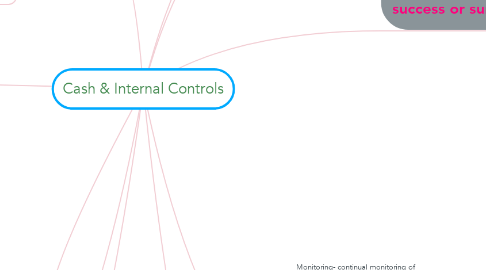
1. Framework for Internal Controls
1.1. Monitoring- continual monitoring of activities and procedures
1.2. Control Activities- policy & procedure
1.3. Risk Assessment- assess risk to achieve goals
1.3.1. 1: Preventative Control- designed to prevent errors/fraud
1.3.2. 2: Detective Control- detect already present error/fraud
1.4. Control Environment- ethical/moral tone of company
2. CASH
2.1. cash equivalent: short term investments that have a maturity date no longer than 3 months from the date of purchase
2.2. coins & currency
2.3. checks recieved
2.4. checking & savings accounts
2.5. credit & debit card sales
3. Controls Over Cash Reciepts
3.1. (1) open and record mail each day
3.2. (2) deposit cash and checks
3.3. (3) record & verify cash receipts by comparing deposit slips and account records
3.4. (4) accept debit/credit cards to limit cash handling
4. Controls Over Cash Disbursements
4.1. (1) make every disbursement on a card if not small
4.2. (2) authorize expenditures & have someone else verify
4.3. (3) checks are serially numbered and authorized...2 signatures for large sums
4.4. (4) periodically agree credit/debit card statements
4.5. (5) if in charge of disbursement, cannot be in charge of receipt
5. Statement of Cash Flows:
5.1. 1. Balance Sheet - final balance for cash
5.2. 2. Statement of Cash - show investors a companies cash flow (in and out) in relation to operation/investing/financing activities
5.2.1. -Operating Activities (cash transactions involving revenue and expense events)
5.2.2. -Investing Activities (cash investments in long-term assets and investment securities)
5.2.3. -Financing Activities (raise cash for/ fund the business through borrowing and owner investment)
6. effective internal controls do not guarantee success or survival
7. Key Roles of Financial Accounting
7.1. to measure business activities
7.2. to communicate business activities
7.3. Reasons for Incorrect Financial Statements
7.3.1. accidental errors when applying accounting rules
7.3.1.1. later resolved & restated
7.3.2. fraudulently entering information in order to deceive for personal gain/ to do damage
7.3.2.1. OCCUPATIONAL FRAUD: the use of ones occupation for personal enrichment through the deliberate misuse or misapplication of the employers resources
7.3.2.1.1. 2: Financial Statement Manipulation
7.3.2.1.2. 1: Misuse of Company Resources
8. Internal Controls
8.1. def: a companies plans to safeguard their internal assets and improve the accuracy & reliability of the accounting information
8.2. quality directly affects financial accounting
8.3. eliminates opportunity...easiest of 3
8.4. SARBANES-OXLEY ACT OF 2002
8.4.1. established a variety of guidelines for auditor-client relations and internal control procedures
8.4.1.1. Eron
8.4.1.1.1. -used questionable practices to cover up $B in debt/loss
8.4.1.2. WorldCom
8.4.1.2.1. misclassified certain expenditures to overstate assets/profitability by $11B
8.4.2. scandals lead stock to plummet, layoffs, and declaration of bankruptcy
9. Bank Reconciliation- matching the balance of cash on the bank account with the balance of cash in the company's own records
9.1. Reconciling the Bank Account
9.1.1. 1: Reconcile banks cash balance
9.1.1.1. what checks written by the company are/are NOT known by the bank?
9.1.2. 2: Reconcile companys cash balance
9.1.2.1. Banks CB - add deposits outstanding, subtract checks outstanding...ERRORS +/- bank errors
9.1.2.2. Companys CB- add notes recieved by bank/interest received, subtract NSF checks/unrecorded debit cards/ unrecorded ETF's/ bank service fees...ERRORS +/- company errors
9.1.3. 3: Update company cash account by recording entries found in step 2
9.1.3.1. update entries company hadn't known about until bank statement
